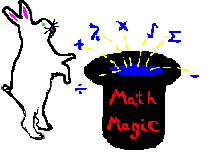

A. This method is the counterpart of Dividing by Specific Numbers.
B. Sometimes it might be easier to change the approximation from multiplying to dividing. See the chart below:
Specific Number/Number Divide By
| 5 | 2 | 142857... | 7 |
| 333... | 3 | 125 | 8 |
| 25 | 4 | 111... | 9 |
| 2 | 5 | 909... | 11 |
| 166... | 6 | 833... | 15 |
Notice, this is almost the same as the chart in the Dividing By Specific Numbers. You have to decide if it is easy to divide or multiply.
C. Like the other section, it is sometimes difficult to tell how many digits the answer will have.
1. In most cases you can simply add the number of digits in the first number to the number of digits minus 1 in the second number for the total number of digits of the answer.
2. If however, the dividing number (from the chart) can go into the first digit at least once, the number of digits of the answer will just be the sum of the digits of both numbers.
D. When dividing it is only necessary to get 2 or 3 numbers then fill in the rest of the remaining digits with 0's.
E. Let's look at a few examples:
Ex [1] 19331 x 143 = __________.
a. In this example, 143 can be changed to dividing by 7.
b. 19331 ÷ 7 = 27.... (2 digits should be sufficient).
c. Since 7 cannot divide into 1 at least once the number of digits is 5 + (3-1) or 7.
d. So we write 2700000.
e. The answer can be between 2626117 and 2902549.
Ex [2] 834 x 2488 = __________.
a. Notice, 2488 is close to 2500, so we can divide by 4.
b. 834 ÷ 4 = 208...(In this example, 3 digits is easy so use 3 digits. You will be more accurate).
c. Since 4 can divide into 8 at least once, the number of digits the answer has is 3 + 4 = 7.
d. The answer we get is 2080000.
e. The answer can be between 1971243 and 2178741.
Ex [3] 134581 x 109 = __________.
a. Notice, 109 is close to 111, so we can divide by 9.
b. 134581 ÷ 9 = 14...
c. Since 9 cannot divide into 1, the number of digits the answer has is 6 + (3-1) = 8.
d. The answer we get is 14000000.
e. The answer can be between 13935863 and 15402795.
F. Note, in Ex [3] we were very close to going over the 5% window. To be more accurate, you divide the number into more place values than just 2. So if you don't feel comfortable, use more digits.